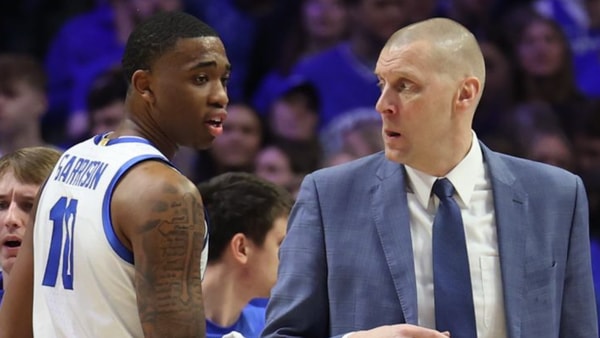NCAA considering removal of scholarship, coach restrictions, among other changes

The NCAA Division I Transformation Committee is discussing several major changes in both college football and basketball in the coming months. Among them? The removal of team scholarship limits and giving schools the ability to hire an unlimited number of full-time assistants.
The Athletic’s Nicole Auerbach spoke with several members of the committee, who shed light on some of the ongoing discussions in its meetings. With pressure coming from government officials and member schools to progress, the Division I Transformation Committee is making it clear it is capable of making changes — drastic ones, at that.
“Making progress on some of this stuff is important for people who think we can’t manage ourselves,” one high-level administrator told The Athletic.
The changes range from quick-fix solutions such as transfer windows and recruiting calendars, to other long-term work such as the infractions process and D-I membership minimums. It’s harder to find bigger changes, though, than the updates on the lifting of personnel and team financial aid limitations.
“This change would eliminate the limit on the number of coaches who may be employed by an institution, and it may or may not be paired with a concept to eliminate all personnel designations (volunteer coach, grad assistant, analyst, etc.),” Auerbach said. “Schools could pay for as many full-time assistant coaches as they can afford. And little things like who is or isn’t allowed to wear a headset during games wouldn’t matter anymore.”
As things stand currently, basketball programs are allowed three full-time on-court assistants, while football programs are allowed 10 full-time on-field assistants. Both sports allow special and graduate assistants, along with quality control and analyst roles. All title and role restrictions would be thrown out the door.
It wouldn’t be just coaching restrictions being lifted, either. Roster limitations could also be tossed out, with the NCAA potentially allowing an unlimited number of scholarship players per school.
Top 10
- 1
Penn State police warning
Saquon celebration triggers warning
- 2
Top 25 shakeup
AP Poll Top 25 prediction
- 3
Ja'Juan Seider
ND targeting PSU assistant
- 4
Bama to No. 1?
ESPN says so with confidence
- 5
Down goes No. 2 Duke
Clemson opens the door for Bama
Get the On3 Top 10 to your inbox every morning
By clicking "Subscribe to Newsletter", I agree to On3's Privacy Notice, Terms, and use of my personal information described therein.
“This may not be fully fleshed out until later in the summer because it would require corresponding legislation regarding limits on roster size by sport. But the idea would be that conferences or schools could decide to offer as many full scholarships for as many sports as they can afford,” Auerbach said. “If you really want to be good at baseball, you can put every single player on the baseball roster on a full scholarship. The thinking behind this idea is simply: If college athletics is supposed to be about opportunities for young adults, then why are there arbitrary caps on team financial aid in any sport? If you can afford it, you can do more.
“This would be a significant shift for a league like the SEC, whose schools are set to receive more money than anyone else in annual distributions from media rights deals and sponsor fewer sports than their peers in the Big Ten or Pac-12. Basically, the idea is schools could decide which sports they want to invest most in to be nationally competitive.”
There are eight total changes in the works, all involving day-to-day life in collegiate athletics. Recruiting calendars may be simplified to two periods, one transfer portal window could grow to two, timeliness on infractions and punishments will be stressed and direct athlete compensation — $5,980 per athlete per year is currently allowed under the NCAA v. Alston ruling — may be increased, among other possibilities.
The NCAA issued new guidance on NIL this week in hopes of cracking down on egregious pay-for-play violations. Now, it appears the association is ready to to make other significant changes in the coming months.









Discuss This Article
Comments have moved.
Join the conversation and talk about this article and all things Kentucky Sports in the new KSR Message Board.
KSBoard